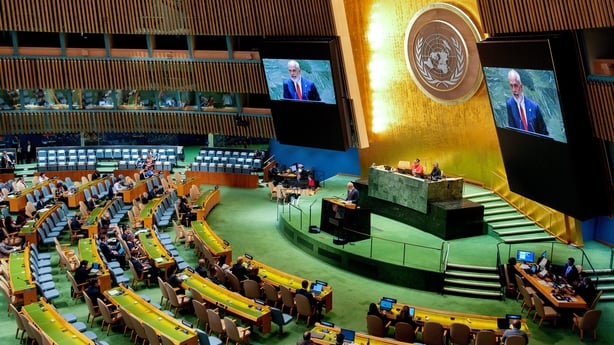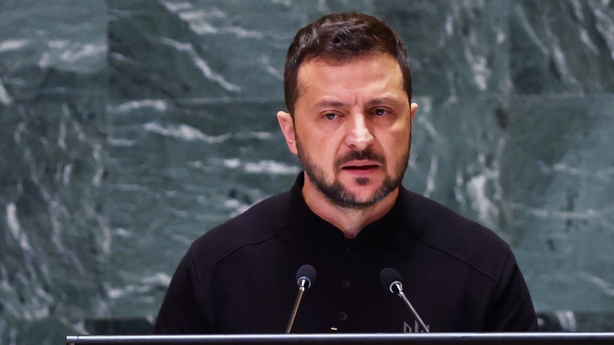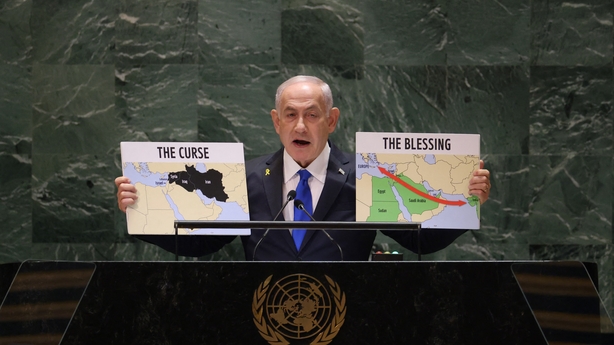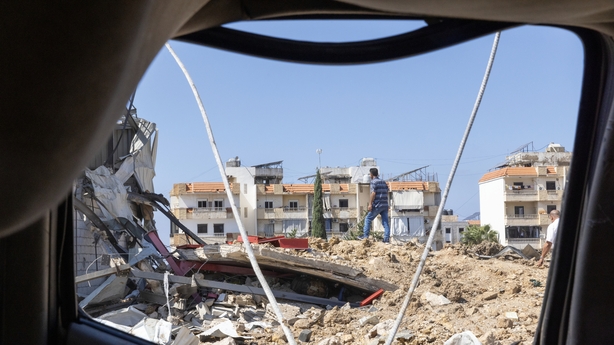For an organisation that's dedicated to world peace, there’s an awful lot of talk of war.
Much of it was expected of course, as the annual UN General Assembly in New York began in the shadow of conflicts already raging in Gaza, Ukraine and Sudan.
But perhaps less expected when world leaders began to arrive here for the opening session on Tuesday, was that by the end of the week, things would be even worse.
A new front opened in the conflict in the Middle East, this time between Israel and Lebanon.
President Putin of Russia continued his offensive in Ukraine and again threatened nuclear war on the rest of the world.
Meanwhile, in the middle of it all, almost unnoticed, China fired an intercontinental ballistic missile into the Pacific Ocean, for the first time in 40 years.

Gloomy general debate
The General Assembly debate ground on. Leader after leader took to the podium to decry the state of the world.
"Our world is in a whirlwind," said Secretary General António Guterres in his opening remarks.
"We are edging towards the unimaginable – a powder keg that risks engulfing the world," he said.
The next speaker - President Luiz Inacio Lula da Silva of Brazil - took the baton of doom and ran with it.
"We are living in a time of growing anguish, frustration, tension and fear," he told delegates.
US President Joe Biden tried to lift the mood with his swansong address to the UN.
"I know many look at the world today and see difficulties and react with despair, but I do not. I won’t," he told his fellow world leaders.
"Maybe because of all I’ve seen and all we have done together over the decades, I have hope," he said.
But as the elderly statesman exited the UN stage for the last time, one couldn’t help but wonder if hope had left with him.
Mounting tensions, frustrated delegates
As conflicts spiralled, the ineffectiveness of the UN was again laid bare - leading some delegates to wonder why they had bothered making the journey to New York at all.
"The institutions, norms, and tools designed to end wars - many of which were championed by a powerful West - are proving increasingly futile," said Dareen Khalifa, senior adviser with the Crisis Group.
"The United Nations has been largely paralysed in responding to major global crises," she said.
And there was little sign of multilateral cooperation as world leaders continued to sabre-rattle and heap insults on each other from the rostrum.

President Volodmyr Zelensky of Ukraine rounded on China and Brazil for putting forward "half-hearted settlement plans" to boost their own power at Ukraine’s expense.
He also dismissed the UN Security Council as a forum to resolve conflict, inviting member states to his own peace summit instead, where he said there would be no veto.
Mr Putin – who wasn’t in New York but at home in Moscow - answered Mr Zelensky’s plea to use long-range missiles, supplied by the US and European countries on targets inside Russia, with another threat of nuclear war.
But Mr Zelensky was fighting for attention as the crisis in the Middle East took centre stage.
In his General Assembly address, the Turkish President Recep Tayyip Erdoğan took aim at Israel’s leader Benyamin Netanyahu, likening him to Adolf Hitler. And many others leaders too condemned Israel’s actions in Gaza and Lebanon.
But when Israel’s prime minister finally took to the UN General Assembly stage on Friday, having initially delayed his trip, he struck a defiant tone, dashing any hopes of an early resolution to the conflict in Lebanon.
A stream of delegates left the hall as soon as Mr Netanyahu took the microphone.
"We will continue to degrade Hezbollah until all our objectives are met," he told UN delegates, saying they must choose between a blessing or a curse – Israel or Iran - in the Middle East.
Addressing Iran – whose chair in the General Assembly Hall sat empty - he said: "I have a message for the tyrants of Tehran. If you strike us, we will strike you".
"There is no place in Iran that the long arm of Israel cannot reach, and that’s true of the entire Middle East," he said.
He went on to denounce the UN as "a swamp of antisemitic bile" and a "house of darkness".
Netanyahu must be stopped, the Jordanian Foreign Minister Ayman Safadi later told reporters, urging the UN Security Council to "perform its duties" and enforce international law.
Or "war will encompass all of us," he said.

Escalation in the Middle East
The Israeli military bombed Beirut. Hezbollah fired rockets into Israel.
In an effort to de-escalate, France called an emergency session of the UN Security Council and hours later, with the US, co-sponsored a 21-day ceasefire proposal for Israel and Hezbollah.
But Israeli officials immediately rejected the idea. Mr Netanyahu said that the military would fight with "full force" in Lebanon.
Fearing another Gaza, despair took hold among UN officials on the ground.
"We are witnessing the deadliest period in Lebanon in a generation, and many expressed their fear that this is just the beginning," said Imran Riza, the UN’s top aid official in Lebanon.
The UN’s refugee agency reported that tens of thousands of people were fleeing across the border into Syria.
"We would make an appeal not only for the bombings in general to stop but also of course to avoid bombing people who are trying to flee," said Gonzalo Vargas Llosa, UNHCR Representative in Syria, at the Syria-Lebanon border.
As Israel continued its onslaught in Lebanon, eyes turned to Hezbollah’s backer, Iran to see what it would do next.
Tehran wants to avoid direct involvement in a regional war that could pit Iran against the United States, according to Alex Vatanka, director of the Iran Program at the Middle East Institute, a think tank.
"It’s more likely to fight Israel via its proxies", he told RTÉ News.
But Tehran is "engaging in a tough balancing act," he said and "this Iranian restraint cannot continue forever if Israel keeps the pressure up, which might well be what Israel decides to do."

Sudan’s bitter conflict
As the crisis deepened in Lebanon, ministers sat down to discuss another devastating conflict, in Sudan.
The side-event came amid reports of a siege on the western city of El Fasher and renewed conflict in the capital Khartoum.
"From bitter past experience, if El Fasher falls, there is a high risk of ethnically targeted violations and abuses, including summary executions and sexual violence, by the RSF (Rapid Support Forces) and allied militia," the UN High Commissioner for Human Rights Volker Türk said.
The American Ambassador to the UN Linda Thomas-Greenfield told ministers at the meeting that civilians in Sudan "are in famine, some reduced to eating leaves and dirt to stave off hunger pains, but not starvation".
But here too, the inaction of the international community loomed large.
"I feel, as I know all of you must, a sense of shame and embarrassment that this is happening on our watch," she said.
Yet humanitarian operations continue to struggle for funding.
According to the UN figures, the $2.7 billion appeal to aid 14.7 million people inside Sudan stands at less than half funded, while a $1.5 billion appeal for 3.3 million refugees from Sudan in seven neighbouring countries, has received a quarter.
As the week drew to a close, a dark mood gripped UN headquarters.
"This General Assembly has been a very serious one – a very intense one," Stéphane Dujarric, a spokesperson for the UN Secretary General told RTÉ News.
"He remains alarmed at the developments on the ground in Beirut, in Gaza and in Sudan, to name just three," he said.







